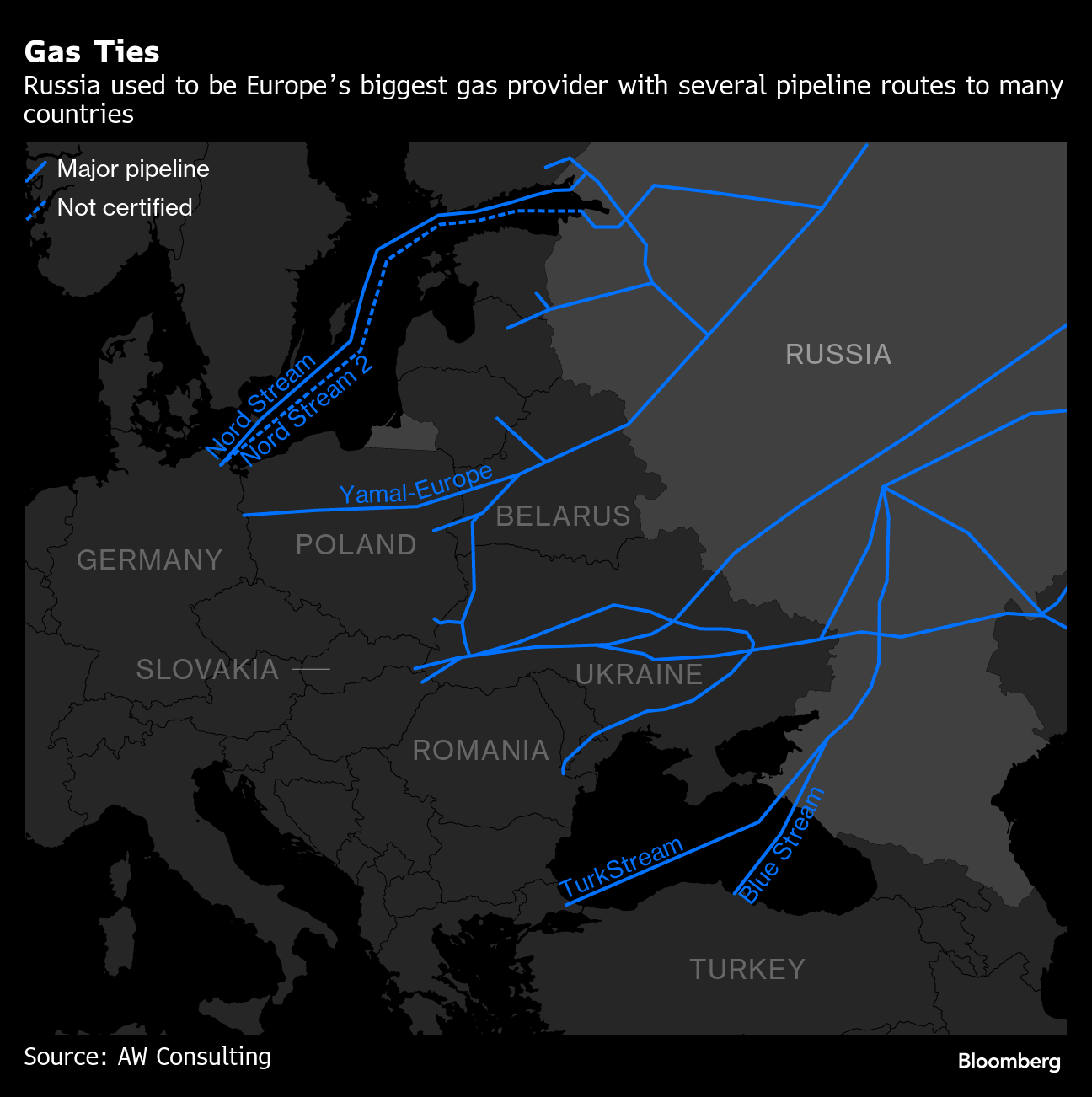EU Proposal to Ban Russian Gas Set for Heated Negotiations
(Bloomberg) -- The European Union’s proposed ban on all Russian gas by the end of 2027 sets the stage for heated debate, with some member states nervous it will boost energy prices and cost companies millions of euros in legal fees.
The European Commission on Tuesday set out the legislation needed to end the bloc’s reliance on pipeline and liquefied natural gas supplies from Moscow, starting by prohibiting new deals from next year. Supplies under existing contracts shorter than one year will be stopped from June 17, 2026 at the latest, with an exemption for landlocked countries such as Hungary and Slovakia.
There’s broad political support for the commission’s push to sever ties with Russia to avoid further risks to EU energy security, despite opposition from those central European nations. While no longer the bloc’s biggest supplier, Russia still accounts for almost a fifth of European demand.
“Russia has repeatedly put at risk Europe’s energy security,” Dan Jorgensen, the EU’s energy commissioner, said in Strasbourg. “We have decided to close the tap.”
A ban on shipments under existing longer-term deals would take effect by the end of 2027.
Still, negotiations over the final shape of the deal are set to kick off with some countries unsure about the feasibility of the proposal.
Talks need to conclude by the end of the year for the phaseout to start in line with the commission’s plan on Jan. 1, 2026, a tight timeline for what is often a lengthy decision-making process in the EU. The bloc’s rules for ending its nuclear reliance on Russia will also be proposed at a later date.
One concern among some member states, including Spain, is whether the law will have the legal heft to allow buyers to invoke force majeure and avoid massive fines from exiting existing contracts. There are also worries about the impact on prices, especially when the EU is struggling to keep its industries globally competitive.

The government in Madrid has asked that the commission consider a mechanism to compensate companies if they incur fines for terminating their contracts, according to people familiar with the matter.
The commission has said the regulation, based on EU trade and energy policies, is strong enough to justify ending contracts. It has argued that alternative supply sources are available and the ban will have a limited impact on prices.
To enforce the ban, the commission wants to oblige importers to provide more transport details such as origin of production, and the identity of parties or the port of first loading for LNG imports. The decision on whether the gas is of Russian origin will be taken by customs authorities, who will cooperate with the commission and European energy regulators.
To better coordinate the shift away from Russian energy, national governments will submit plans to show how they’re working to end gas shipments by the end of 2027. Similar plans will be required for the phaseout of Russian oil, already largely banned under EU sanctions.
To address the concerns of Slovakia and Hungary, the commission proposed that they can import Russian gas under short-term contracts until the end of 2027 after supply routes under long-term contracts changed following the halt of transit via Ukraine. Even so, Hungarian Prime Minister Viktor Orban was quick to slam the commission’s proposals, which come against the backdrop of the Israel-Iran conflict.
“If Brussels bans Russian sources for good, it would mean cutting off the most important crude oil and natural gas pipelines supplying Hungary,” he said in a Facebook post on Tuesday. “This is incredibly dangerous in the middle of a war. And now, in the shadow of the war in the Middle East, it’s downright crazy.”
The European Commission decided not to use sanctions on gas as that would require unanimity from all 27 member states. Instead, it proposed a measure based on weighted majority support that would allow it to bypass the objections from Hungary and Slovakia.
Still, some countries support the aim of ending Russian gas flows but have reservations over the means to do so.
Austria warned the proposals could stretch EU gas infrastructure and wanted to explore the possibility to reassess the rules should a peace deal between Ukraine and Russia be reached, the people said, asking not to be named as the discussions are private.
The commission’s proposal envisages an option to review the regulation in the case of risks to security of supply.
(Updates with details on Hungary and Slovakia from second paragraph, reaction from Hungary’s Orban in 13th paragraph.)
©2025 Bloomberg L.P.





